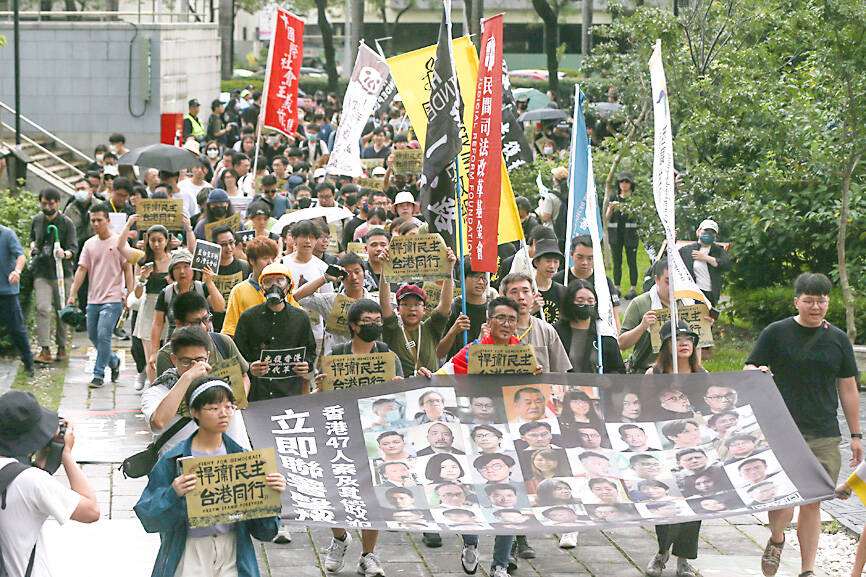Taiwan yesterday condemned China over the jailing of 45 Hong Kong activists, saying “democracy is not a crime.”
The government “strongly condemned the Chinese government’s use of judicial measures and unfair procedures to suppress the political participation and freedom of speech of Hong Kong’s pro-democracy activists,” Presidential Office spokeswoman Karen Kuo (郭雅慧) said in a statement.
International condemnation of the jailings has been swift, with the US, Australia and rights groups slamming the sentencing as evidence of the erosion of political freedoms in the territory since Beijing imposed a national security law in 2020.

Photo: I-Hwa Cheng, AFP
Yesterday’s sentencing “not only breaks the promises of ‘50 years unchanged’ and a ‘high degree of autonomy,’ but also further proves the unworkability of ‘one country, two systems,’” Kuo said, referencing the 50-year transitionary governance model after the handover from the UK in 1997.
“The people of Taiwan and Hong Kong share a common pursuit of freedom and democracy,” she said.
The Mainland Affairs Council urged the Hong Kong government to protect its citizens’ rights, cease political oppression and release detained democracy supporters.
Multiple incidents over the past few years have dealt a blow to Hong Kong’s international ratings on democracy and human rights, the council said.
The Hong Kong government should protect its people’s rights, freedom of speech and the right to an unbiased judiciary process, it said.
The Democratic Progressive Party also condemned the rulings, saying that the full-on persecution of Hong Kong’s democracy supporters highlights the Chinese Communist Party’s (CCP) authoritarian nature.
The forced passage of Article 23 of Hong Kong’s Basic Law and the National Security Law has destroyed Hong Kong’s democracy and human rights, and exposed the sham of “one country, two systems,” it added.
The Chinese Nationalist Party (KMT) said it continues to support democracy and freedom, adding that the ruling was inconducive to rallying Hong Kongers’ support for the CCP government.
Nonviolent methods of expressing opinions are a norm of democratic society and should be a fundamental right of the people, the KMT said.
The Taiwan People’s Party (TPP) said it adamantly opposes such repressive authoritarianism and urged the CCP to answer international concerns regarding its conduct.
The TPP caucus in May urged the Mainland Affairs Council to flesh out ways for Hong Kongers to seek political asylum or pursue business immigration, it said, calling on the administration to support Hong Kong.
Hong Kong Outlanders, a Hong Kong support group in Taiwan, panned the ruling as illogical and symbolized the death of the concepts of the rule of law and an independent judiciary in Hong Kong.
The group urged the Taiwanese government to continue to support Hong Kong protesters and provide them with channels to conditionally seek asylum.
It also called on the Taiwanese government to promote and guarantee Hong Kongers’ basic rights in Taiwan, providing them a haven from cross-border threats from the CCP.
Additional reporting by Chen Yun, Lin Hsin-han and Lin Che-yuan

MAKING WAVES: China’s maritime militia could become a nontraditional threat in war, clogging up shipping lanes to prevent US or Japanese intervention, a report said About 1,900 Chinese ships flying flags of convenience and fishing vessels that participated in China’s military exercises around Taiwan last month and in January have been listed for monitoring, Coast Guard Administration (CGA) Deputy Director-General Hsieh Ching-chin (謝慶欽) said yesterday. Following amendments to the Commercial Port Act (商港法) and the Law of Ships (船舶法) last month, the CGA can designate possible berthing areas or deny ports of call for vessels suspected of loitering around areas where undersea cables can be accessed, Oceans Affairs Council Minister Kuan Bi-ling (管碧玲) said. The list of suspected ships, originally 300, had risen to about 1,900 as

Japan’s strategic alliance with the US would collapse if Tokyo were to turn away from a conflict in Taiwan, Japanese Prime Minister Sanae Takaichi said yesterday, but distanced herself from previous comments that suggested a possible military response in such an event. Takaichi expressed her latest views on a nationally broadcast TV program late on Monday, where an opposition party leader criticized her for igniting tensions with China with the earlier remarks. Ties between Japan and China have sunk to the worst level in years after Takaichi said in November that a hypothetical Chinese attack on Taiwan could bring about a Japanese

The WHO ignored early COVID-19 warnings from Taiwan, US Deputy Secretary of Health and Human Services Jim O’Neill said on Friday, as part of justification for Washington withdrawing from the global health body. US Secretary of State Marco Rubio on Thursday said that the US was pulling out of the UN agency, as it failed to fulfill its responsibilities during the COVID-19 pandemic. The WHO “ignored early COVID warnings from Taiwan in 2019 by pretending Taiwan did not exist, O’Neill wrote on X on Friday, Taiwan time. “It ignored rigorous science and promoted lockdowns.” The US will “continue international coordination on infectious

DEEP-STRIKE CAPABILITY: The scenario simulated a PLA drill that turned into an assault on Taiwan’s critical infrastructure, with the launchers providing fire support Taiwan yesterday conducted this year’s first military exercises at Longsiang Base in Taichung, demonstrating the newly acquired High Mobility Artillery Rocket System’s (HIMARS) ability to provide fire support and deep-strike capabilities. The scenario simulated an attack on Penghu County, with HIMARS trucks immediately rolling into designated launch areas and firing barrages at the Wangan (望安) and Cimei (七美) islands, simulating the provision of fire support against invading forces. The HIMARS are supposed to “fire and leave,” which would significantly increase personnel and equipment survivability, a military official said. The drill simulated an exercise launched by the Chinese People’s Liberation Army (PLA) Eastern